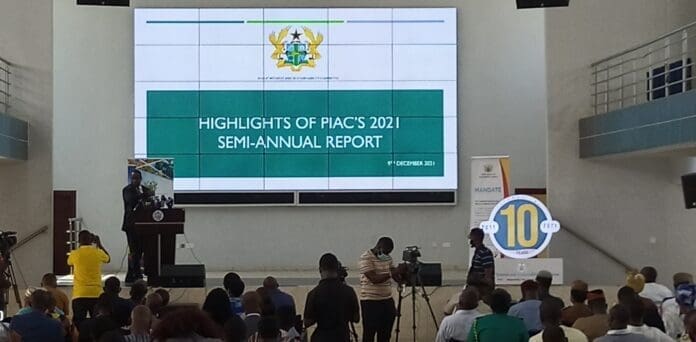The Public Interest and Accountability Committee (PIAC) confronts its most significant operational challenge in 14 years of existence, following legislative changes that eliminated its dedicated funding stream from petroleum revenues under the amended Petroleum Revenue Management Act (PRMA).
Recent amendments to the PRMA passed earlier this year through Act 1138 effectively removed provisions that previously guaranteed PIAC a dedicated portion of petroleum revenues to fund its operations, creating unprecedented uncertainty for Ghana’s primary petroleum revenue watchdog.
Established in September 2011 through the original PRMA (Act 815), PIAC emerged as part of comprehensive efforts to ensure transparency and accountability in managing Ghana’s newfound oil wealth. The committee’s three-fold mandate encompasses monitoring government compliance with petroleum revenue laws, providing public platforms for citizen engagement, and delivering independent assessments to Parliament and the Executive.
The oversight body has published 27 statutory reports since its inception, including 13 annual and 14 semi-annual assessments that have become authoritative sources for petroleum revenue analysis. These publications have enhanced transparency by providing comprehensive data on production, allocations, distribution, and utilization of Ghana’s oil revenues.
PIAC has not released its 2025 semi-annual report, which was expected in July, raising concerns about operational capacity under the new funding arrangement. The committee traditionally publishes two mandatory reports annually as required by Section 56 of the PRMA.
The funding crisis stems from the 2025 PRMA amendment that redirected the entire Annual Budget Funding Amount (ABFA) exclusively toward infrastructure development under the government’s “Big Push” initiative. The amendment channels 100 percent of ABFA funds toward infrastructure investment, with only 5 percent allocated to District Assemblies, effectively eliminating PIAC’s previous funding mechanism.
PIAC’s impact extends beyond reporting, having influenced two major PRMA amendments in 2015 and 2025 through its findings and recommendations. The committee’s work led to the 2019 passage of PRMA Regulations and corrected recurring issues with International Oil Companies paying state revenues into incorrect accounts.
The organization operates through representatives from 13 member institutions across Ghanaian society, serving either two-year renewable or three-year non-renewable terms. This diverse membership structure ensures balanced representation and expertise in petroleum revenue oversight functions.
Throughout its operational history, PIAC faced initial funding challenges, relying heavily on donor support from organizations including the German development agency GIZ, Oxfam USA, and the Natural Resource Governance Institute. The 2015 PRMA amendment secured dedicated ABFA funding that provided operational stability from 2016 through 2024.
The committee’s activities include conducting project inspections across Ghana, organizing regional and district-level townhall meetings, and maintaining an interactive data dashboard on petroleum revenue statistics. These initiatives have strengthened citizen engagement and promoted accountability in resource governance.
PIAC recently warned about declining trends in Ghana’s upstream petroleum sector, noting crude oil production has fallen for five consecutive years while the industry faces investment challenges. The committee advocates for fresh investments and implementation of onshore petroleum exploration policies.
Civil society organizations have proposed expanding PIAC’s mandate to include mineral revenue oversight, recognizing the transparency benefits achieved in petroleum revenue management. Some stakeholders suggest increasing PIAC’s powers to extend accountability mechanisms beyond current limitations.
The committee’s 14-year journey demonstrates significant contributions to national development discourse through consistent monitoring, public education, and policy recommendations. However, the current funding crisis threatens operational continuity and raises questions about sustained oversight of Ghana’s petroleum revenues.
Looking forward, PIAC continues engaging government officials regarding funding restoration while maintaining its commitment to transparency and citizen participation in resource governance. The organization’s future effectiveness depends on resolving the financial constraints created by recent legislative changes.
The committee’s operational challenges coincide with ongoing debates about petroleum revenue utilization, infrastructure prioritization, and maintaining democratic oversight mechanisms in natural resource management across emerging economies throughout Africa.
Source: newsghana.com.gh











